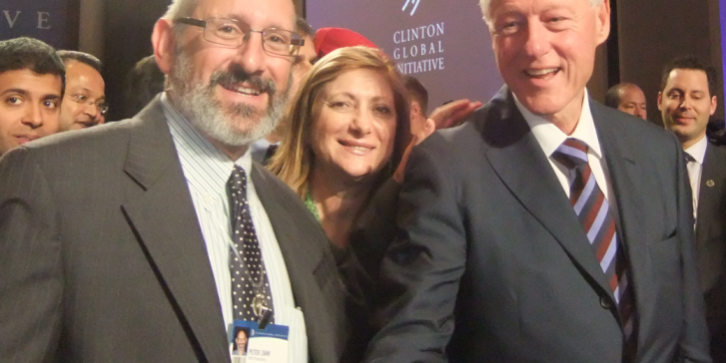Peter Zahn, USGCC’s Chairman attended last week’s sessions and filed this report:
Attending the Clinton Global Initiative (CGI) meetings is an exhilarating experience. This unique event, which is hosted by former President Bill Clinton and coincides with the opening of the U.N. General Assembly in New York, brings together leaders from corporations, nonprofits, and governments around the globe to address BIG social and environmental problems. While there was an interesting smattering of celebrities in attendance – and an awards ceremony with musical performances by Sting and K’aan – the central focus is on numerous meaty commitments that are made to solve or ameliorate the problems. The results are uber-impressive, with promises to spend billions of dollars and massive hours pursuing creative, measurable approaches to issues such as AIDS eradication, sanitary drinking water, expanded educational opportunities, and preventing environmental degradation.
Environmental sustainability and climate change were key topics at this year’s gathering. At the opening session eight heads of State sat on a panel on climate change. Moderated by Bill Clinton, the Presidents or Prime Ministers of Mexico, South Africa, Norway, the European Union, Bangladesh, Slovenia, and Mali spoke their minds. President Calderon of Mexico (the country that hosted the last UN climate change meeting in Cancun) and Zuma of South Africa, (who will be hosting the next meeting in Durban, South Africa), weighed in on the challenges faced by countries big and small. Calderon, whose country faces tough issues such as mass killings by drug cartels, put things into perspective when he declared that climate change is “the most challenging problem for the world for the future.” The Cancun Climate Change assembly committed last year to a maximum 2º C global temperature rise and reduced deforestation. Calderon said the challenges facing the group this December in Durban are daunting. One of the critical issues is that the Kyoto Protocol will expire in 2012. Despite several major countries (including the USA and China) failing to commit to Kyoto, it would be an enormous setback if the world comes away without any significant greenhouse gas reduction agreements.
President Zuma’s wish is for specific implementation plans to come out of the Durban conference. He said, “at least we need guidelines that will hold up until the world players can agree on legally binding terms.”
Norway’s prime minister was particularly gloomy. “We should have seen a comprehensive legally binding agreement” by now, he said. Seeking broad support, he said that “even if you doubt the problems of climate change, limits will help in other areas like energy efficiency.” He pressed for the adoption of initiatives that were supported at Cancun: establishment of a Green Fund to assist the countries that will be most impacted, further progress on deforestation controls, and the introduction of a price on carbon.
Small countries are particularly worried. The Prime Minister of Grenada, speaking for the alliance of Small Island States, said most development in those countries is on the coast, and “rising sea levels will hurt tourism [and the economy].” He called for some form of monitoring of the agreements that are made, as well as the transfer of technology regarding renewable energy. “We have a moral responsibility to preserve and protect the earth,” he stated.
Slovenia’s Prime Minister was emphatic about the need to engage the business community much more, in the absence of a world government that can take effective action. He believes a carbon tax should be a priority.
Bangladesh’s Prime Minister, another panel member, was pessimistic, stating that “a 1 degree C rise in temperature will displace 30 million people”.
Mali’s Prime Minister sounded a note of optimism. He feels that an agreement between the world’s nations is “ambitious but not impossible.” Anything that affects his country also affects the USA and other countries. “We have all been discussing, but now is the time to act”, he declared.
The President of the European Union cited the fact that 90 countries have set domestic targets for GHG reductions. To make the Durban talks successful he urged that the technology agreements made in Cancun must be implemented. He also called for “a clear roadmap to a comprehensive agreement”, saying that “the science and public opinion is on our side.”
The Prime Minister of Mali said that “we have to make ordinary people understand that this is not a burden, it’s an opportunity.”
Bill Clinton was succinct but substantive in his observations. He lamented the sorry state of sensationalist rhetoric and political posturing from climate change deniers. He called for both political action and to show every community that there is economic opportunity (read “jobs”) in participating in the Green economy. In other words, a community’s efforts to combat climate change results in more jobs. On the political front he cautioned that we cannot turn young people off, urging that “young people should not run from politics.” More fundamentally, Clinton said we have “got to change the experience of people so they view how climate change affects them and their communities.”
The CGI sessions were inspiring. Much like Bill Clinton, at USGCC we need to constantly look for opportunities to effectively transform ideas into action.







